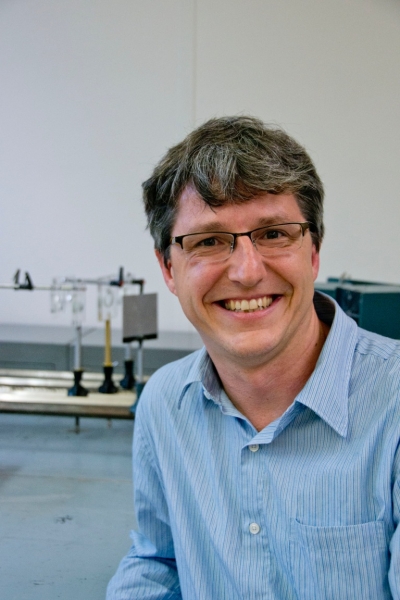
Like many physicists, Michael Wittmann (’93) was drawn to the subject because it’s a way of understanding how the world works. But Wittmann is also interested in understanding how teaching and learning work. “I come from a line of teachers and physicists and engineers,” he says. “So I grew up with dinner table conversation about both of those topics.”
To satisfy both of his interests, Wittmann specializes in physics education research (PER) at the University of Maine, where he was recently promoted to full professor. He is a member of the research group at the Physics Education Research Laboratory there, as well as the Center for Research in STEM Education, which he co-founded in 2001. He also co-chairs the biennial Foundations and Frontiers of Physics Education Research conference in Bar Harbor, Maine.
To Wittmann, there’s a little bit of physicist in everyone—or there ought to be. “It irritates me when I’m at a party and someone says, ‘What do you do?’ and I say, ‘I’m a physicist,’ and their response is, ‘Oooh, that’s hard.’ They are forgetting that they are scientists by nature—they have questions about the world, and we can answer them. As a teaching community, we’re missing the boat if people have that reaction.”
Of course, teaching physics can be tricky because everyday experiences sometimes don’t appear to mesh with the laws of physics. For example, physicists often think about how things work in the absence of friction, but friction rules our everyday world, where bricks fall faster than feathers, and objects in motion tend to slow down and stop. “What makes teaching physics really interesting is that clash between intuition and formalism,” Wittmann says.
Wittmann studies physics education at all levels from middle school to upper level physics. No matter the level, his goal is to understand what the student is thinking and work from there. Lately, he’s been studying the use of gesture in teaching and learning physics. Sometimes students don’t have the formal vocabulary to describe what they are thinking and gestures can help them communicate. “I’m curious to understand how people are thinking about the physical situation and gestures help me see more of what people are thinking,” he says.
At UMaine, Wittmann teaches physics to both physics majors and non-science majors, and he also teaches physics education to future teachers. He especially enjoys advising physics graduate students who are focusing on PER. “I think one of the biggest joys I have in my career is working with graduate students and watching them go from novices and apprentices to being true colleagues,” he says.
He also enjoys working with middle school and high school teachers on a variety of projects, and helps put on a yearly meeting of high school physics and physical science teachers at the University of Maine. “I want to influence the teaching of physics so that we spend more time helping people develop thinking skills and questioning the world around them,” he says. “There are lots of opportunities to show people interesting ways that physics can be used to understand the world.”

Wittmann himself was inspired by his high-school physics teacher, David Green at Jordan High School here in Durham. “It’s crazy—I can still remember half the experiments I ran in his class and it’s been 25 years,” Wittmann says. “There was a strong emphasis on experimental work so we would draw conclusions from our observations as opposed to spending time on mathematical analysis. He put a lot of the responsibility of learning in our own hands and worked to give us the tools when we needed them.”
Wittmann would love to inspire future and current teachers to use similar techniques to keep students engaged. He points out that young children are naturally curious about the world, but by high school that curiosity has often waned, or been stifled. “We have a job to do to help students keep curiosity alive, and help them realize that curiosity plays a really big role in how they approach science,” he says.
After graduating from Duke, Wittmann earned his master’s degree and PhD in physics from the University of Maryland. He moved to Orono in 2001 to take the position at the University of Maine. He and his wife—a UNC grad—have two children. Wittmann has dual Austrian-American citizenship, and was raised speaking German at home, and he’s continuing that tradition with his children.
Having grown up in the south, Maine’s long dark winters were a challenge at first, but now Wittmann says he loves where he lives, and Durham seems awfully hot when he visits. “You have to get used to snow,” he says. “You just learn to go cross-country skiing and do as much outdoors as you can.” Wittmann also plays goalie on an indoor soccer league and is a DJ at the campus radio station, building on his undergraduate experience as a DJ at Duke’s WXDU.
Note: Another Duke alum, Kristine Callan, PhD 2013, is also working in the field of PER. Callan recently accepted a position at the Colorado School of Mines. Click here for more information.
Mary-Russell Roberson is a freelance science writer who lives in Durham.